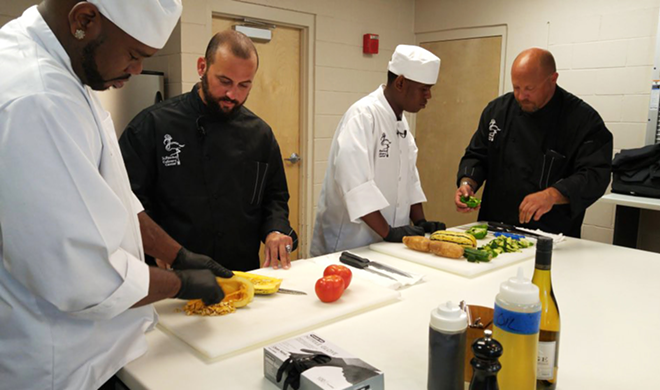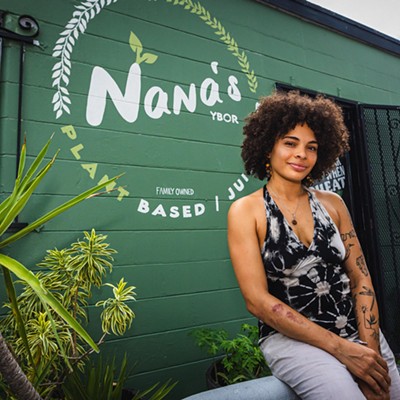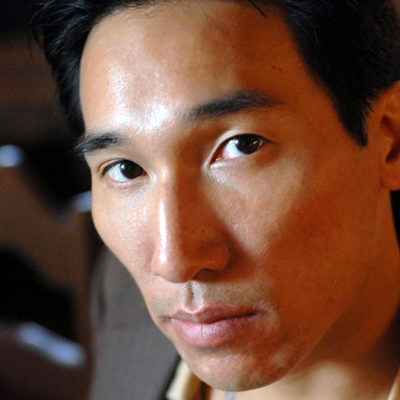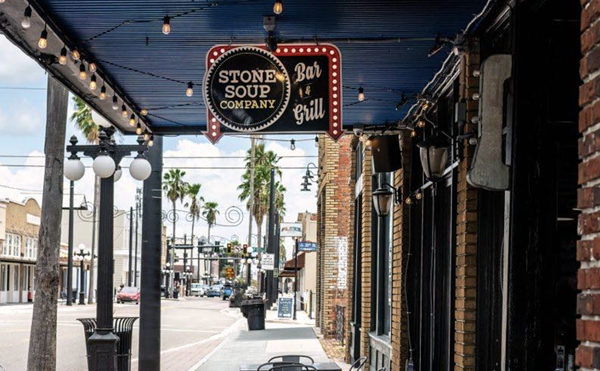
Chop... chop... chop. The sound of knives hitting cutting boards could be heard from outside the kitchen door of Childs Park Recreation Center Monday afternoon.
Donning black chef's coats, three St. Petersburg chefs — Gratzzi Italian Grille's Tony Mangiafico, Jason Esposito of Engine Restaurant Group and Parkshore Grill's Tyson Grant — paired up with students dressed in white jackets, chopping squash, peppers and tomatoes, side by side.
Adrian Anthony, who grew up in the Childs Park area of St. Petersburg, is one of those students. He gets straight to the point of why he's enrolled in the new St. Pete Culinary Center (SPCC): He wants to inspire his neighborhood.
"I want to give back to the community so a lot of young people don't follow the same road that I did," Anthony said, referring to when he went to prison (where he got his G.E.D.) at age 16.
After he got out, he landed a job at Tropicana Field, where he started out working the night shift, sweeping up peanut husks. He’s since been promoted to manager, and is also working as a prep cook for The Mill in downtown St. Pete. An aspiring playwright, he hopes to one day own a restaurant and run a studio à la Tyler Perry.
"And now I go around and I speak to the young people and let them know even though you're in this trouble, you're in this path, don’t never let nobody say that you can't be nobody, because look at me — I'm a prime example," he said.
The Mill's Ted Dorsey says the nonprofit SPCC, which is completely free for the at-risk young adults it serves, is giving Anthony and others a second chance through cooking. It wasn't formed to boost the respective restaurants of the chefs involved; it's not about that.
Employees at his restaurants have come in as dishwashers and steadily moved up the ranks because their work ethic is so solid. Some have even become a roundsman, chef-speak for a person who's able to work every station in the kitchen. That's why SPCC focuses on creating jobs for its students.
"It's great to see, when we started talking about doing this culinary center, how quickly all of these local chefs were like, 'I want to be a part of it,'" Dorsey said. "I can teach you how to work a station. I can teach you how to do prep. I can teach you how to do all these things — tend bar, wait tables. But you can't teach hard work ethic, will, determination, and that's what these young adults [have].
"And for us, it's about a second chance. Most of the people in our business have made mistakes and done stupid things, and it's giving these guys a second chance. That's what our program focuses on — job creation more than anything."
According to the U.S. Bureau of Labor Statistics, food industry positions like restaurant cooks and food preparation workers are among the occupations that will see the most job growth between 2014 and 2024. For Dorsey, that's important.
"The thing about our business is you can go anywhere in the world and do this. People are always gonna have to eat — even if the dynamic of food changes," he said. "You're starting to see that a little bit now with the transition to more fast-casual places."
SPCC is housed inside the Childs Park Recreation Center, which has a classroom and fully functional kitchen (a lab, if you will) for the curriculum Dr. Michael Lynch has developed. The first class is set to kick off Jan. 8.
The 12-week program's morning lessons — with lectures, videos, PowerPoints — will take place inside the classroom environment, while afternoon sessions are planned for the lab. Here, well-known local chefs Mangiafico, Esposito, Grant, Dorsey, Locale Market's Jeffrey Hileman and Jason Cline, formerly of The Birchwood, will supplement SPCC's in-house chef by teaching portions of different courses.
Classes are set to cover topics like basic knife skills, how to manage a kitchen, food identification, basic soups and sauces, nutrition, sanitation, and a little introduction to menus.
"Our purpose here, our goal, is to provide these students with an entry-level skill set so they can walk out of here and get a job. But [also] have some skills that would put them ahead of the person who's not in the training," said Dr. Lynch, who owns Seminole Heights' Ox & Fields and teaches at the Art Institute of Tampa. "The restaurant business is very difficult, and a lot of people come and go. It's the highest turnover rate in the industry. A lot of that is because they're not prepared with the basics."
Another part of the program is soft-skills training laid out by the city. Students will learn how to tie a tie, create a résumé and go through mock interviews to help them become more comfortable with the interview process.
Cooking is done outside the rec center, too. Similar to the "externship" chefs go through during culinary school, the students (12 is the goal to start) will be mentored at each chef's restaurant — while getting paid.
"They're gonna spend a week at Locale, a week at The Mill, a week at Gratzzi," Dorsey said. "I'm excited. I want them to learn. And it's not about my restaurant or his restaurant. It's about all these chefs coming collectively together for the greater good. And that's amazing because you don't see that a lot."
Networking with chefs throughout St. Pete, who are also owners and restaurateurs, is a whole 'nother benefit. Dr. Lynch says establishing relationships with local chefs, getting to know them on a personal level, will help students stand out when applying for future industry positions.
They won't get lost in a pile of other applications in person or online.
"We'll give them a headstart to their career, plus they'll be able to network. They're gonna be able to meet chefs from all over the city so our career growth will be amazing. We'll basically have access to the city, and with St. Pete's support, we'll have no problem placing these kids," Dr. Lynch said.
After students complete the program, SPCC will help them get hired at area restaurants, potentially ones the chefs they train under call home.
There are also job opportunities for alums outside the world of restaurants. Westminister Palms, Bayfront and the Tampa Bay Rays have food production and kitchen facilities that aren't as fast-paced or high-stress.
"This is why," chef Grant said when CL asked why he wanted to get involved with SPCC. "Teaching kids how to do it the way we want to teach them, not really how it would come out in a state curriculum or something like that. We want to teach them what we think would be best in our kitchens. That way, when they do come with in our kitchens, we're ahead of the game."
Chef Grant says his biggest problem right now is finding good help ("everybody applies to be a server or a hostess or a bartender; nobody wants to come back in the kitchen and cook anymore"). Through the program, he hopes they can turn the students into fine cooks for hire.
As far as they're concerned, chef Hileman says, there's a right way and a wrong way to do things in the kitchen; they'll be breaking bad habits from the start. He also notes that it's much easier to bring in new folks who have a great attitude, willingness and desire to succeed versus people who think they know it all.
"Of course it's a great way to give back to the community and maybe give a first shot, or even a second shot, to somebody who might not have the opportunity otherwise. But again, it's a great way for us to help these young culinarians get off the floor and really learn proper techniques. There's definitely great community benefits, but great restaurant benefits as well,” Hileman said.
According to student Ray Kennedy, who's been cooking for about a year and knows it's what he wants to do for the rest of his life, he's excited about the entire curriculum. Having previously worked under Hileman at Locale, Kennedy is now at The Mill.
"I feel as if this wasn't — things happen for a reason. I feel like this was put into me for a reason. And my granddad was a chef, too," Kennedy said. "After he found out my career path and what I was doing, he got in contact with me, letting me know of his past career as a chef. He says it's running in the blood."
Kennedy will bring his Junior ROTC background from Gibbs High School to SPCC. The mission of JROTC, he says, is to promote young people to become better citizens.
"And I'm a living witness to say that is true," he added.
What's he looking forward to the most?
"I want to start training my palate to know all these different tastes from instinct," Kennedy said.
Chef Esposito says SPCC allows him to get a different perspective and learn another aspect of food through the program's students. He says Kennedy is who he was 25 years ago, and that he can already see the local touches the young cook brings to the kitchen.
"He's gonna learn what took us years and thousands and thousands of dollars," Esposito said. "I think he has a great opportunity with everybody else. He's already in the local culinary scene, so I don't think you're gonna see this guy disappear. I think he's gonna grow in this community, and I hope to see him thrive. Just don't take me out."
The plan is to expand, fairly quickly, to accommodate more students. Dorsey says the nonprofit is partnering with community activists, churches and city programs to find potential students. Kennedy and Anthony can help explain to other candidates what the program will be like as well.
Frank Wells, who has another nonprofit called Venture House, acts as the SPCC board's community liaison in south St. Pete. Since there are several community organizations and social services asking, "How do I get students in there?" he thinks the program will be an asset to the area.
"There's so many people that need this kind of easy training, low cost. It'll get them into jobs. There's a critical need for that in this community, so we know we've got more interest than we have capacity," Wells said.
Dorsey agrees: "There's been a lot of programs, both private and city, for south side St. Pete. Some work, some don’t. But I think ours will work because of the job application. That's the whole goal — give them the training, give them a job."
Anthony says a culinary center for St. Pete is a good thing.
"There's not a lot to do. People get out of school with nothing else to do. Like when I was growing up, there was nothing to do, so of course we'd go hang out and get into trouble," Anthony said. "Some people get caught, some people don't. I got caught, so I just thank god I made it out of prison, and I'm doing better with my life."
















